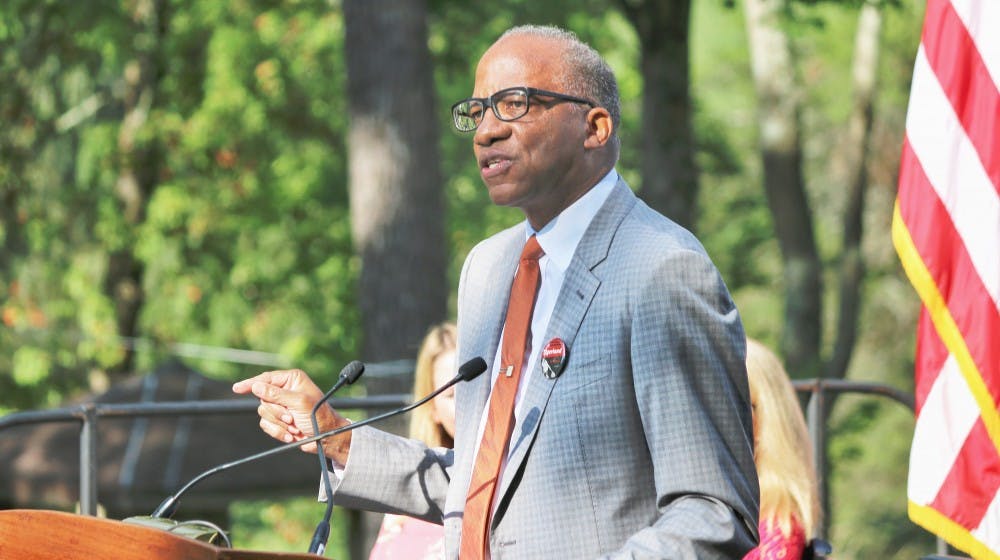The year was 1968. Martin Luther King Jr. and Robert F. Kennedy had both been assassinated. Turmoil spread across the country, but in Columbus, Ohio, a segregated high school came together around two all-star athletic teams and stood in the face of diversity.
Thirteen-year-old Wil Haygood knew something special was happening in his community. He and his friends would beg their parents for the 50 cents it cost to watch the East High Tigers play basketball at the fairgrounds' coliseum.
"They were more than just a team because they were the soul and heartbeat and pride of the city's black east side community," Haygood (Miami '76) said. "Everybody, even if you went to other high schools, followed the East High Tigers."
In his previous stories, Haygood has covered the lives of Thurgood Marshall, Sammy Davis and a longtime White House butler. Now, in his latest novel "Tigerland" he tackles the story of the state-winning baseball and basketball teams at East High School in the '68-'69 seasons.
East High, Haygood said, was known in Columbus as the token all-black school.
Haygood is proud of the story, which takes place in his hometown, though he only attended East High for one year before graduating from the integrated Franklin Heights.
At the time, East High's district was illegally segregated. In 1954, the Brown v. Board of Education case ruled state-sanctioned segregation of public schools was a violation of the 14th amendment. This ruling should have desegregated high schools everywhere; however certain cities, including Columbus, continued their segregationist practices well into the '60s, Haygood said.
When school began at East in the fall of '68, the white power structure was nervous about what the black students might do at the school, Haygood said.
"The leader of black America had just been assassinated," he said. "It was like the soul of the community had been stomped on and even worse. It was an unimaginable loss."
At the time, Jack Gibbs, who was East's first black principal, made it his mission to tell the student body that they could not fall.
"He said, 'We cannot do unwise things and let the city think that we don't have control over our actions or who we are,'" Haygood said. "He instilled pride in the students, and I think because of him, the students wanted to prove that they could do something to honor Martin Luther King Jr.'s legacy, and the most attention from many people in the community, on a positive note, came to the school via athletics."
"Tigerland" was given to Miami first-years a month before its wide release, after being selected by the first-year reading committee and President Gregory Crawford.
Enjoy what you're reading?
Signup for our newsletter
"It's very magical for me as a Miami graduate to return to this school to share this book with the freshman student body," Haygood said. "I also think that the book is very timely with all of its themes, themes that we are seeing in the headlines today. "It's such a national story in its scope and in its epic sweep."
People in the U.S. tend to gravitate toward sports stories such as "Friday Night Lights" and "Remember the Titans," Haygood said.
"These are all great stories with a meaning outside the world of sports. ["Tigerland"] was just a story that spoke to me as a cultural historian and a journalist. If you think it's a story about sports, you tend to come to it with excitement built up. If you can take the reader deeper into the narrative and make some strategic turns like I do in 'Tigerland,' it's so much the better. You've given the reader a sports story, but in my situation, you've also given them a story about this nation."
Though the story takes place 50 years ago, it is relevant to today's society, Haygood said. Today, while there is more respect for the black community and black representation across all levels of government, there is more to be done, he added.
"There's no doubt it can be linked to the people in power in Washington right now," Haygood said. "Promoting civil rights is not on their agenda. It's painfully clear."
He hopes "Tigerland" will help to show there can be triumph at the end of a journey, especially if it's a difficult one.
"When you show this to people, then you tend to gain converts. You tend to change people's attitudes, maybe not their minds, but their attitudes."
"Tigerland" will be officially released on September 18.
davisa10@miamioh.edu




